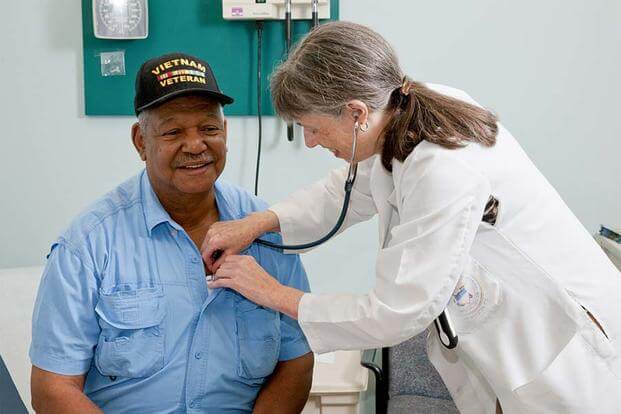VA health care is as good or in some cases better than that offered by the private sector on key measures including wait times, according to a study commissioned by the American Legion.
The report, issued Tuesday and titled "A System Worth Saving," concludes that the Department of Veterans Affairs health care system "continues to perform as well as, and often better than, the rest of the U.S. health-care system on key quality measures," including patient safety, satisfaction and care coordination.
"Wait times at most VA hospitals and clinics are typically the same or shorter than those faced by patients seeking treatment from non-VA doctors," the report says.
The 17-page report was co-authored by Phillip Longman, a senior editor at the Washington Monthly and adjunct professor at Johns Hopkins University, and Suzanne Gordon, a health care journalist and assistant adjunct professor at the University of California at San Francisco School of Nursing.
The report comes at a time when the Trump administration, Congress and the VA are considering a long-term overhaul of the Veterans Choice Program, which allows veterans to seek VA-funded care through private providers.
In July, Congress approved a $3.9 billion bill to extend the Veterans Choice Program on private care for six months. Funding for Choice had been due to run out in mid-August, according to the VA.
The Choice program, established after a 2014 scandal over extended wait times for care at VA medical facilities, allows veterans who face a more than 30-day wait for an appointment, or who must travel more than 40 miles to a VA facility, to instead seek VA-funded care through private providers.
In a memorandum last week to VA Secretary Dr. David Shulkin, the VA's Office of Inspector General warned that the Choice program continues to be plagued by problems with duplicate payments, overpayments, and a failure to offset payments against outside insurance coverage.
"These deficiencies must be addressed in the process of awarding additional contracts to any [contract payment processors] that may be selected for the future iteration of the Choice Program currently under consideration by Congress," the IG's Office said.
Since the Choice program's inception, the American Legion and other Veterans Service Organizations (VSOs) have cautioned against attempts to use it as a smokescreen to privatize the VA.
Legion-commissioned report says, "Although there are opportunities for VA to improve its performance by entering into partnerships with other health-care providers, no evidence supports the claim that privatizing VA or substantially outsourcing its services would bring veterans better care."
The report continues, "In evaluating the quality of VA care, one should first remember to ask an all-important question: "Compared to what?"
On wait times, "The entire American health-care system faces acute shortages of doctors, especially primary care physicians and mental health professionals. This means that even fully insured patients seeking care outside VA often face long wait times to see doctors," the report states.
The report cites numerous studies, including one by industry consulting firm Merritt Hawkins showing the wait time to get a first appointment with a private-sector doctor averaged 24 days in 15 metropolitan areas.
"By contrast, the latest available data shows that one in five VA patients is seen on the same day he or she makes an appointment," the report says.
"Even though roughly 16 percent of VA primary care facilities are operating at over 100 percent of capacity, for the system as a whole, the average wait time to see a VA primary care doctor is five days, and nine days for appointments with VA specialists," it states.
"The familiar narrative about wait times at VA being worse than in the rest of the system is just demonstrably untrue," the report says.
-- Richard Sisk can be reached at Richard.Sisk@Military.com.






























